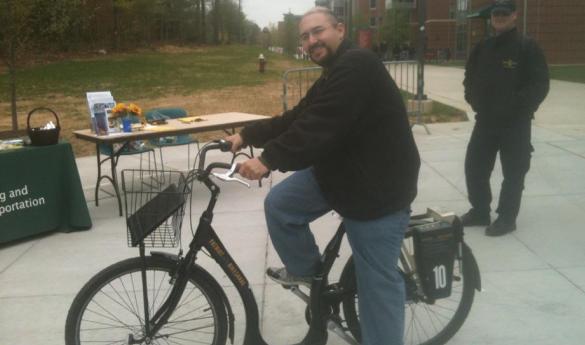Cycling enthusiasts ride in sixth annual Bike to Mason Day
In case you hadn’t marked your calendars, April 23 was the annual Bike to Mason Day. The event is a six-year-old tradition celebrating George Mason University's cycling culture and encouraging more sustainable forms of transportation. Mason’s Office of Sustainability and Office of Parking and Transportation worked together to encourage students to seek out alternative ways of getting to and from campus.
The event staffers didn’t just stand behind the tables, covered in fruit platters and various bike-themed pamphlets. At several points throughout the day students and administrators rode bikes around the Southside plaza. Among them were Marina Budimir, transportation coordinator, and Josh Cantor, the director of the office of parking and transportation.
Budimir explained that Mason has hosted this event since 2008, but there has been some confusion in the past. May 17 is Fairfax’s Bike to Work Day, with which Mason usually tries to coordinate. But this year, May 17 fell in the same week as Mason’s commencement week, so Budimir’s office rescheduled to align with Earth Week and refocus on sustainability at Mason.
“The target population is students that live within a few miles of campus,” Cantor said. “Biking makes it pretty easy to get around and is often faster.”
Despite the morning’s cold weather, Cantor and the others maintained that spring was a perfect time to start biking instead of driving to school. For Cantor, the benefits extend beyond just the students. As Mason begins closing more parking lots across campus, alternative means of transportation can help alleviate the strain on the campus parking decks.
“With a bike, you don’t need a parking pass. There are around 1,000 spaces on campus to park, and we’re in the process of installing another 100 racks next year,” Cantor said.
However, the emphasis on a biking culture on the Fairfax campus has been difficult to apply to the Prince William campus. According to Cantor, the Prince William campus doesn’t lend itself easily to alternative transportation. The campus is more isolated than Fairfax, so the challenge is in creating a more urban environment to make it bike friendly.
“At Arlington, its already built into the local culture,” Cantor said. “We already have a Capital Bike Share station at Arlington.”
The Bike Share programs are a new feature to the Fairfax campus and represent part of the larger effort to emphasize a new culture of biking.
“We’re helping to cultivate the bike culture,” Cantor said. “It gives people options.”

